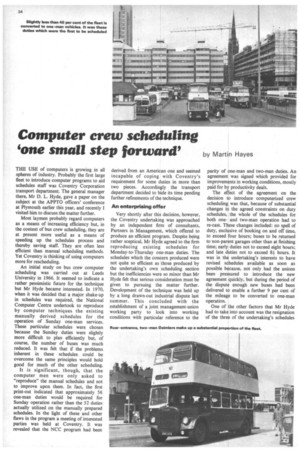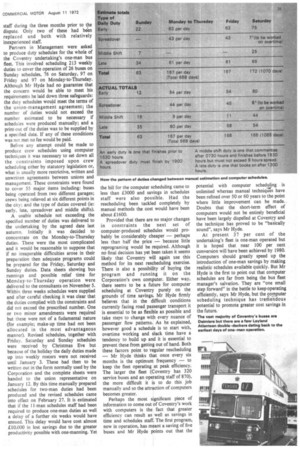Computer crew scheduling
Page 36

Page 37

If you've noticed an error in this article please click here to report it so we can fix it.
'one small step forward' by Martin Hayes
THE USE of computers is growing in all spheres of industry. Probably the first large fleet to introduce computer programs to aid schedules staff was Coventry Corporation transport department. The general manager there, Mr D. L. Hyde, gave a paper on the subject at the APPTO officers' conference at Plymouth earlier this year, and recently I visited him to discuss the matter further.
Most laymen probably regard computers as a means of increasing efficiency but, in the context of bus crew scheduling, they are at present more useful as a means of speeding up the schedules process and thereby saving staff. They are often less efficient than manual scheduling methods. Yet Coventry is thinking of using computers more for rescheduling.
An initial study on bus crew computer scheduling was carried out at Leeds University in 1966. It seemed to indicate a rather pessimistic future for the technique but Mr Hyde became interested. In 1970, when it was decided that a major shake-up in schedules was required, the National Computer Centre undertook to reproduce by computer techniques the existing manually derived schedules for the operation of Sunday one-man services. These particular schedules were chosen because the Sunday duties were slightly more difficult to plan efficiently but, of course, the number of buses was much reduced. It was felt that if the problems inherent in these schedules. could be overcome the same principles would hold good for much of the other scheduling.
It is significant, though, that the computer men were only asked to "reproduce" the manual schedules and not to improve upon them. In fact, the first print-out indicated that approximately 56 one-man duties would be required for Sunday operation rather than the 52 duties actually utilized on the manually prepared schedules. In the light of these and other flaws in the program a meeting of interested parties was held at Coventry. It was revealed that the NCC program had been derived from an American one and seemed incapable of coping with Coventry's requirement for some duties in more than two pieces. Accordingly the transport department decided to bide its time pending further refinements of the technique.
An enterprising offer
Very shortly after this decision, however, the Coventry undertaking was approached by an independent firm of consultants, Partners in Management, which offered to produce an efficient program. Despite being rather sceptical, Mr Hyde agreed to the firm reproducing existing schedules for Monday-to-Thursday one-man duties. The schedules which the concern produced were not quite so efficient as those produced by the undertaking's own scheduling section but the inefficiencies were so minor than Mr Hyde felt that serious consideration must be given to pursuing the matter further. Development of the technique was held up by a long drawn-out industrial dispute last summer. This concluded with the establishment of a joint management-union working party to look into working conditions with particular reference to the parity of one-man and two-man duties. An agreement was signed which provided for improvements in working conditions, mostly paid for by productivity deals.
The effect of the agreement on the decision to introduce computerized crew scheduling was that, because of substantial changes in the agreed constraints on duty schedules, the whole of the schedules for both oneand two-man operation had to re-cast. These changes included: no spell of duty, exclusive of booking on and off time, to exceed four hours; buses to be returned to non-parent garages other than at finishing time; early duties not to exceed eight hours; and late duties not to exceed 8+ hours. It was in the undertaking's interests to have revised schedules available as soon as possible because, not only had the unions been pressured to introduce the new agreement quickly, but during the period of the dispute enough new buses had been delivered to enable a further 9 per cent of the mileage to be converted to one-man operation.
One of the other factors that Mr Hyde had to take into account was the resignation of the three of the undertaking's schedules staff during the three months prior to the dispute. Only two of these had been replaced and both with relatively inexperienced staff.
Partners in Management were asked to produce duty schedules for the whole of the Coventry undertaking's one-man bus fleet. This involved scheduling 213 weekly duties to cover the operation of 26 buses on Sunday schedules, 76 on Saturday, 97 on Friday and 97 on Monday-to-Thursday. Although Mr Hyde had no guarantee that the concern would be able to meet his requirements he laid down three safeguards: the duty schedules would meet the terms of the union-management agreement; the number of duties would not exceed the number estimated to be necessary if schedules were produced manually; and a print-out of the duties was to be supplied by a specified date. If any of these conditions was not met no fee would be paid.
Before any attempt could be made to produce crew schedules using computer techniques it was necessary to set down all the constraints imposed upon crew scheduling either by statutory legislation or, what is usually more restrictive, written and unwritten agreements between unions and management. These constraints were found to cover 55 major items including: buses being operated from two different garages; crews being relieved at six different points in the city; and the type of duties covered (le: early, late, spreadover and middle shifts).
A usable schedule not exceeding the specified number of duties was delivered to the undertaking by the agreed date last autumn. Initially it was decided to concentrate on the Monday-to-Thursday duties. These were the most complicated and it would be reasonable to suppose that if no insuperable difficulties arose in their preparation then adequate programs could be prepared for the Friday, Saturday and Sunday duties. Data sheets showing bus runnings and possible relief time for Monday-to-Thursday operation were delivered to the consultants on November 5. Within three weeks schedules were supplied and after careful checking it was clear that the duties complied with the constraints and did not exceed the prescribed number. One or two minor amendments were required but these were not of a fudamental nature (for example; make-up time had not been allocated in the most advantageous manner). Revised schedules, together with Friday. Saturday and Sunday schedules were received by Christmas Eve but because of the holiday the daily duties made up into weekly rosters were not received until January 3. These had then to be written out in the form normally used by the Corporation and the complete sheets were handed to the union representative on January 12. By this time manually prepared schedules for two-man duties had been produced and the revised schedules came into effect on February 27. It is estimated that if the 11-man schedules staff had been required to produce one-man duties as well a delay of a further six weeks would have ensued. This delay would have cost almost £10,000 in lost savings due to the greater productivity possible with one-manning. Yet
the bill for the computer scheduling came to less than £3000 and savings in schedules staff were also possible. Had the rescheduling been tackled completely by manual methods the cost would have been about £1600.
Provided that there are no major changes in constraints the next set of computer-produced schedules would probably be considerably cheaper — perhaps less than half the price — because little reprograming would be required. Although no final decision has yet been taken it seems likely that Coventry will again use this method for its next rescheduling exercise. There is also a possibility of buying the program and running it on the Corporation's own computer. Either way, there seems to be a future for computer scheduling at Coventry purely on the grounds of time savings. Mr Hyde firmly believes that in the difficult conditions currently facing road passenger transport it is essential to be as flexible as possible and take steps to change with every nuance of passenger flow patterns. As he explained, however good a schedule is to start with, overtime working and slack time have a tendency to build up and it is essential to prevent these from getting out of hand. Both these factors point to 'regular rescheduling — Mr Hyde thinks that once every six months is the optimum frequency — to keep the fleet operating at peak efficiency. The larger the fleet (Coventry has 320 service buses and an operating staff of 870), the more difficult it is to do this job manually and so the attraction of computers becomes greater.
Perhaps the most significant piece of information to come out of Coventry's work with computers is the fact that greater efficiency can result as well as savings in time and schedules staff. The first program, now in operation, has meant a saving of five buses and Mr Hyde points out that the
potential with computer scheduling is unlimited whereas manual techniques have been refined over 50 or 60 years to the point where little improvement can be made.. Doubts that the short-term effect of computers would not be entirely beneficial have been largely dispelled at Coventry and the technique has proved to be "basically sound", says Mr Hyde.
At present 37 per cent of the undertaking's fleet is one-man operated but it is hoped that near 100 per cent conversion will have been achieved by 1980. Computers should greatly speed up the introduction of one-man savings by making realistic schedules available quickly. But Mr Hyde is the first to point out that computer schedules are far from being the bus fleet manager's salvation. They are "one small step forward" in the battle to keep operating efficiently, says Mr Hyde, but the computer scheduling technique has treiriendous potential to promote greater cost savings in the future.




























































































